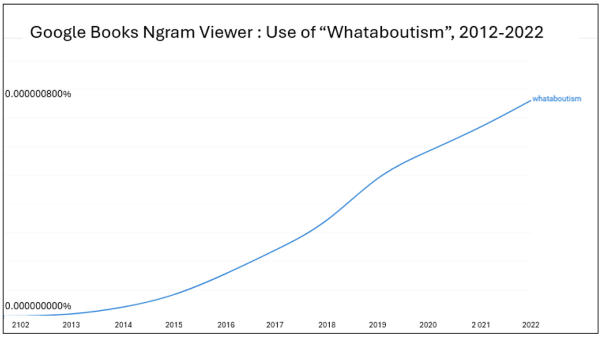The term "whataboutism" first appeared in print in 1978, but wasn’t much used until 2007-2008, when British journalist Edward Lucas popularized the term in The Economist. The use of whataboutism in American political discourse increased sharply around the 2016 US presidential election with Donald Trump’s routine use of it in response to criticism. Whataboutism’s rising visibility has been attributed to increased political polarization and the role of social media in amplifying its popularity.
Stop the presses! Something’s wrong with that first paragraph, which paraphrases an AI Overview: It mixes up use of the word ‘whataboutism’ with the practice of whataboutism. For example, Donald Trump didn’t routinely use the word whataboutism - he was routinely accused of the practice*. But was he actually engaging in whataboutism? Hard to say, since attributions of whataboutism can be pretty subjective.
However, there’s no doubt that use of the word ‘whataboutism’ has skyrocketed in print over the past decade:
Note: Percentages based on database of approximately 5.2 million digitized books. Whataboutism value in 2022 was 0.0000007613%.
What’s unclear to me is whether it’s just a word whose use has risen, or if people are actually whatabout-ing more often than before. I’m not sure how you would measure that. Whataboutism accusations impute ill-intent: to deflect attention from an uncomfortable truth. In other words, the accusation of whataboutism is a form of mindreading. But how do we know it’s the truth of another’s intent, or the whole truth? And is wanting to reframe or change subjects always a bad thing? Obviously not. But how do we know when it’s bad and when it’s not?
In the next post, I’m going to explore these question by looking at how ‘whataboutism’ was used by members of my debate club.
—
* For example, this from the AI source Britannica : “During his 2016 presidential campaign, throughout his presidency (2017–21), and since declaring his candidacy in the presidential election of 2024, Trump has routinely responded to criticisms or allegations of wrongdoing by himself or his supporters with whataboutist and other extreme ad hominem attacks. Frequently cited examples include his 2017 response on Twitter (now X) to accusations that his presidential campaign had colluded with Russia (‘What about all of the Clinton ties to Russia, including Podesta Company, Uranium deal, Russian Reset, big dollar speeches etc.[?]’) and his 2017 response at a news conference to criticisms of violence committed by white supremacists at a pro-Trump rally in Virginia earlier that year (‘What about the alt-left that came charging at the, as you say, alt-right? Do they have any semblance of guilt?’).”
